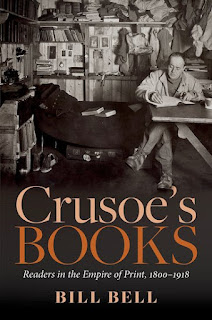 Bill Bell is Professor of Bibliography at Cardiff University and Research Fellow at the University of Munich.
Bill Bell is Professor of Bibliography at Cardiff University and Research Fellow at the University of Munich.
He applied the “Page 99 Test” to his new book, Crusoe’s Books: Readers in the Empire of Print, 1800-1918, and reported the following:
Page 99 lands the reader right in the middle of chapter 3 on the reading practices of nineteenth-century convicts, ‘The Indiscipline of Reading’. Over half of the page is dedicated to the following poem:Visit the Crusoe's Books blog.For Library books, I give my voiceThe 1863 transcriber called it ‘a specimen of true convict poetry’. The author was probably the Irish political prisoner, John McCullagh, who was sentenced to seven years transportation for eight convictions and appears to have written it while he was incarcerated on Spike Island in 1856. The chapter as a whole is about the way that the penal authorities in the period sought to regulate reading habits among the prison population, prescribing pious texts and closely monitoring their use. This poem lays out the writer’s preference for adventure tales about notorious criminals rather than the improving stories of the Great and Good provided by the authorities.
When thus selected—here’s my choice;
Our Irish Rogues and Rapparees,
The Scottish, Welsh, and English thieves:
These would I read, with great delight,
When from the truck I get respite.
On Humphrey Davy, and his science,
The boys of Spike have no reliance.
Or give us some more fearful tale,
Of convict life, or city jail:
This is the theme, that would please me,
And bring to mind some former spree.
Or Robin Hood, and Little John;
The life of Turpin I could con;
Freney, O’Hanlon, and the like,
Would make me merry while in Spike.
Your humble servant J. M’C.
Fit subject for Reformatry.
In this instance, the Page 99 Test seems to have worked admirably well. Crusoe’s Books traces the reading practices of five constituencies in the long nineteenth century (emigrants, Scottish settlers, convicts, polar explorers, and troops in the First World War). What emerges, time and again, is the tendency for disenfranchised readers to respond in unpredictable ways. Page 99 follows on immediately from an argument by Michel de Certeau where tactical resistance is evident among the most common practices of everyday life. Consequently, Certeau’s ideal reader is not held in the thrall of a regulatory world, a passive recipient, but famously a ‘poacher’ operating on the territory of others. One of the major themes of the book is how, in the face of official directives and prescriptive literacies, readers in the long nineteenth century, from the most literate to the most meagrely educated, were to use a range of cultural practices for their own ends.
--Marshal Zeringue



